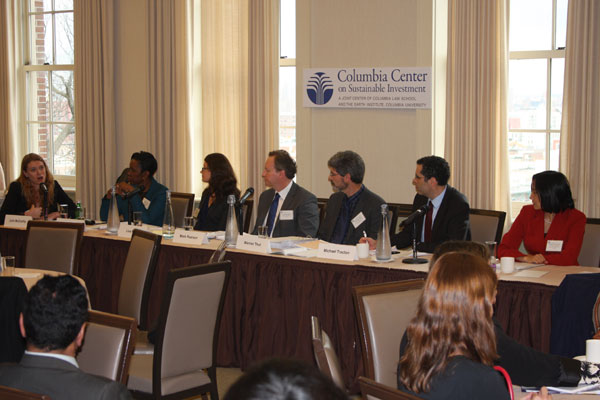

Julie McCarthy (left, speaking), director of the Open Society Foundations' Fiscal Governance Program, addresses panelists on Wednesday at a discussion during Columbia University's 9th Annual International Investment Conference. Jack Freifelder/ China Daily
Officials in the world's two largest economies agree that the need for oversight initiatives in governing sustainable foreign investment flows is paramount to increasing transparency in the global marketplace.
The challenge is reaching a consensus and implementing the measures on a country-by-country basis, according to a director with the National Economic Research Institute (NERI) in Beijing.
"For China, the concept of corporate social responsibility is new," Lisa Wang, NERI's deputy director said Wednesday during a panel discussion at Columbia University. "People need time to learn about these things to get used to it, so there are a lot of questions. It's not a problem of wanting to do it, it's more about how to go about it."
"If you assume a multilateral investment framework, you have to rely on the capacity in the different countries," she said. "A few Chinese companies like Huawei have annual training for their new hires because they're international companies, but poorer countries don't have the proper framework. There are some very practical challenges here that we have to face."
On Wednesday, Columbia University held its Ninth Annual International Investment Conference entitledRaising the Bar: Home Country Efforts to Regulate Foreign Investment for Sustainable Development.
Nearly 300 guests attended the daylong conference, including foreign officials and members of multinational corporations (MNCs) from a number of countries.
Julie McCarthy, director of the Open Society Foundations' Fiscal Governance Program, served as moderator for the discussion.
The need for a consensus on the regulation of sustainable foreign investment is a view shared by companies and individuals from China, to the United States and beyond, saidMichael Trachton, director of the Office of Investment Affairs for the US Department of State.
"Investment sustainability issues are a huge deal for the US government," Trachton said. "President Obama was just talking about economic sustainability at the APEC Summit. Industry is very concerned about a level playing field. We want a high bar of sustainability and we want it to be fair so that our firms are not the only ones doing the right thing."
"A whole range of things we do, including measures like the Foreign Corrupt Practices Act and other anti-bribery conventions, are done to promote sustainable business more broadly," he said. "It's certainly a careful balance. It varies from issue to issue, but you need to look at what the private sector is already doing."
Lisa Misol, senior researcher on business and human rights at Human Rights Watch, said countries should establish a "broad standard" for corporate governance and other similar transparency-oriented measures.
"Civil societies try to be opportunistic where we see there's an opening for a chance to have an impact on issues, and we also work really hard to create opportunities," Misol said.
Corporate responsibility was not officially introduced in China until 2006, Wang said. In the meantime, the government has done a lot of work to introduce the regulation of the measures to push companies to perform and behave better, and there is a group of leaders that have emerged in China already that are setting an example for the rest of the country.
In terms of the unilateral effort versus the multilateral effort, given what's already there at the country level it's very easy to come up with a multilateral investment framework on paper, Wang said. "It can increase awareness and provide a new tool for NGOs that already exist in those countries. The ideas are there but the challenge is really in the implementation," she said.
China, US to accelerate bilateral investment treaty negotiations
2014-11-12Investment treaty would benefit China and US: Kerry
2014-11-09Chinese investment in US diversifies
2014-10-17US must be objective, rational on China-Africa investment: FM
2014-08-07China-US investment treaty on fast track
2014-07-10Removing investment barriers a win-win step for China, US
2014-07-09Copyright ©1999-2018
Chinanews.com. All rights reserved.
Reproduction in whole or in part without permission is prohibited.